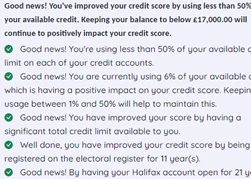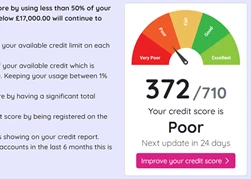What is Identity Theft?

18th Apr 2025
Identity theft happens when someone steals your personal information to assume your identity. Identity fraud is when they use that stolen information for their own financial gain, often leaving you with significant costs and damage. If you’re unlucky enough to have your identity stolen and find a fraudster has taken out credit in your name, then your credit score is going to be badly affected, and it could take several months and lots of phone calls to sort it all out.
In many cases, identity thefts go unnoticed for a while, and you might only realise your information has been stolen when you receive a bill or welcome letter for something you didn’t purchase or sign up for. If you are not monitoring your credit score regularly, then you might not notice new accounts or debts being added to your credit file until several weeks have passed. If you look at your credit file on a regular basis you stand a better chance of picking up fraud quickly and nipping it in the bud.
5 Common Ways Fraudsters Steal Your Identity
- Physical Theft
Your personal belongings, such as your wallet or documents, may be stolen, giving fraudsters access to ID like driving licence, credit cards or paperwork with your address on. - Fake Calls
Fraudsters impersonate legitimate businesses over the phone, trying to trick you into sharing personal and financial details, or give them access to your bank accounts. - Hacking
Fraudsters may use software to hack into your computer or smartphone to steal sensitive information. - Phishing
You might receive emails that appear to be from trusted companies, asking you to click on a link or download an attachment. - Data Breach
Many large companies have suffered data breaches, where their customer details have been stolen by criminals who then use them to take out credit.
How Identity Theft Can Impact You
If fraudsters use your identity, then lenders have no way of knowing that it’s not you taking out lots of credit if you don’t notice and tell them. This could affect your ability to borrow money, rent property, or access certain services. These negative marks will show up on your credit report and influence how you're perceived financially.
How to Protect Your Credit Score Against Identity Fraud
Being proactive is key to protecting your financial health. Recognising early red flags and building good habits to protect your identity can go a long way in preventing fraud. Here are some steps to protect yourself:
- Regularly monitor your financial accounts and credit report.
- Be careful when sharing personal information over the phone, online, or in person unless you’re absolutely sure who you’re speaking to.
- Use strong, unique passwords and enable two-factor authentication on your accounts.
- Be wary of unsolicited emails and phone calls asking for your information.
There is lots of information online about identity theft and what you should do to protect yourself. Don’t be paranoid, just take a second to stop and think before clicking on suspicious links or telling a cold caller your bank account or passport number.
Don't risk missing
something important
Access a comprehensive credit report
that includes detailed data from TransUnion
View your credit score for only £1.95.
You can view it for 1 month, after which it will be £14.95 per month unless cancelled.
See How You Score

See How You Score
An Independent View Of Your Credit Score
Lenders typically use their own systems to calculate your Credit Score based on the information in your Credit Report, often checking with one or more Credit Reference Agencies. Your Credit Check Online Credit Score is derived from all the Credit Report information we gather from TransUnion, helping you understand how you might be assessed when applying for credit.

Understand What is Affecting Your Credit Score
Quickly see how the details in your Credit Report influence your Credit Check Online Credit Score, both positively and negatively. This clear overview helps you identify areas for improvement and better understand the factors that lenders consider when assessing your creditworthiness.
View your credit score for only £1.95.
You can view it for 1 month, after which it will be £14.95 per month unless cancelled.